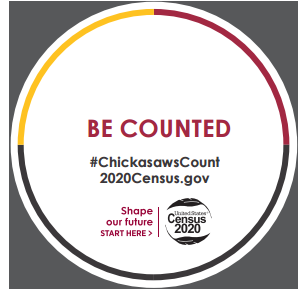Important to respond to U.S. Census

This article appeared in the April 2020 edition of the Chickasaw Times
Virtually every household in the U.S. will, by April 1, receive an invitation to participate in the U.S. Census 2020. This year, every household will have the option of responding online, by mail or by phone. The 2020 Census is historic. It marks the first time participants can respond online.
Americans Indians, including Chickasaws, are encouraged to participate in the Census. Census data is collected once a decade. That data will determine the annual allocation of more than $675 billion in federal funds. Nearly $1 billion is earmarked for Indian Country.
Between April 20-27, a final reminder postcard from the U.S. Census Bureau will be sent to households who have yet to respond. Census takers will visit households that have not completed their questionnaire between May and July.
It is important both households and individuals identify as American Indian, including the tribe with which they identify. Whether a household is counted an American Indian or Alaska Native depends entirely on the race of ‘Person 1,” or the first person listed on the Census form. If that person states they are American Indian or Alaska Native, the household will then be counted as one with an American Indian or Alaska Native “householder” for statistical purposes.
After checking the box identifying as American Indian or Alaska Native on the 2020 Census form, participants will be asked to print the name of their “enrolled or principal tribe.”
In the 2020 Census, Chickasaws will be coded and counted as part of the tribe by writing “Chickasaw.”
Census data for the American Indian and Alaska Native population and their tribal affiliations are currently collected by a check box and write-in space under the race question, where the name of the tribe can be added. This space records up to six entries. Chickasaws should write in “Chickasaw.”
About the Census
Data collected by the 2020 Census is critically important. By participating, American Indians will be speaking for generations of people. Census data helps ensure American Indian voices are heard. Participating in the Census expresses pride in being American Indian.
Information tabulated from the Census is kept confidential and secure. U.S. Census Bureau employees are prohibited by law from sharing personal information with anyone.
Federal funding for American Indian housing programs, transportation, health care and more are distributed on the basis of Census data. This information is also used to allocate Congressional seats, electoral votes and is the basis for redistricting. An accurate count of American Indians is vital to ensure they have a proper representative voice in the political process of non-tribal elections.
The federal government utilizes Census data to provide programs and services to the people living in the local community. Additionally, private businesses use the information to decide where to invest and create local jobs. Tribal leaders, planners, grant writers and others can access this information to supplement citizenship data and other resources.